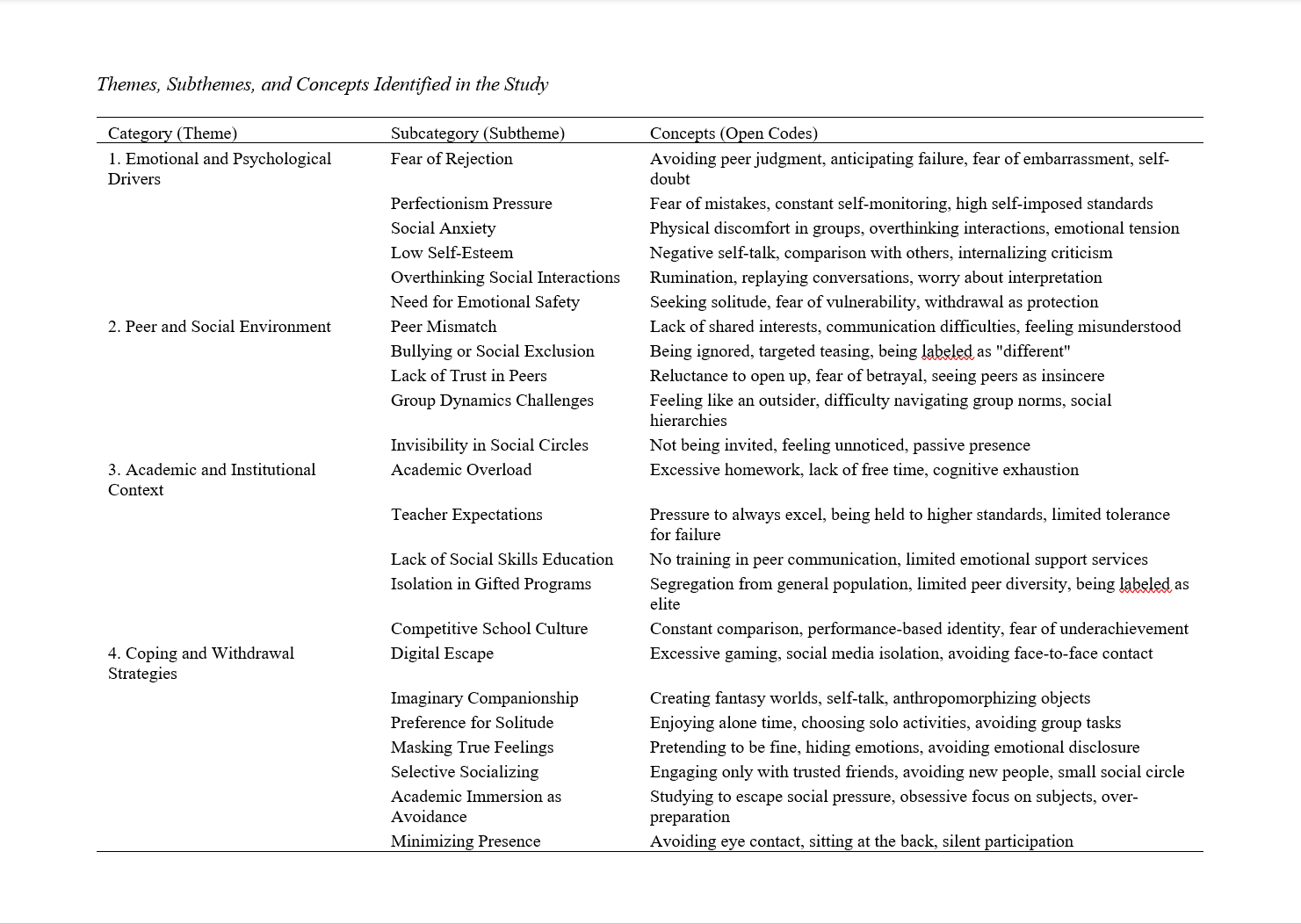Identifying Dimensions of Social Withdrawal in Academically Gifted Youth
Keywords:
Gifted adolescents, social withdrawal, emotional development, qualitative research, peer relationships, coping strategies, educational environmentAbstract
Objective: This study aimed to explore the underlying dimensions of social withdrawal in academically gifted adolescents through a qualitative lens, focusing on emotional, social, academic, and behavioral factors.
Methods and Materials: A qualitative research design was employed using semi-structured interviews with 27 academically gifted adolescents aged 12 to 18 years from various regions in the United States. Participants were selected through purposive sampling to ensure diversity in gender, ethnicity, and school setting. Data collection continued until theoretical saturation was reached. All interviews were transcribed verbatim and analyzed thematically using NVivo software, following a multi-stage coding process involving open, axial, and selective coding to extract key themes and subthemes.
Findings: Thematic analysis revealed four main categories contributing to social withdrawal in gifted adolescents: emotional and psychological drivers, peer and social environment, academic and institutional context, and coping and withdrawal strategies. Subthemes included fear of rejection, perfectionism, social anxiety, peer mismatch, bullying, academic overload, and digital escape, among others. Participants described both internal vulnerabilities and external pressures leading to voluntary isolation. While some withdrawal behaviors were associated with emotional distress, others served as self-protective strategies to maintain control and authenticity in unsupportive environments. Quotations from participants illustrated the complexity and depth of these experiences.
Conclusion: Social withdrawal in academically gifted youth is a multidimensional phenomenon shaped by a dynamic interaction between personal dispositions and environmental conditions. Recognizing both the risks and adaptive aspects of withdrawal is essential for designing responsive educational and psychological support systems.
Downloads
References
Albright, E. A., & Montgomery, D. (2023). Perceptions of the Emotional Self for Adolescents Who Are Gifted. Roeper Review, 45(1), 6-20. https://doi.org/10.1080/02783193.2022.2145399
Bakaeva, I., & Valuiskaya, L. (2019). Features of School-Based Anxiety of Intellectually Gifted Adolescents in the Modern Educational System. SHS Web of Conferences, 70, 08004. https://doi.org/10.1051/shsconf/20197008004
Darbani, S. A. (2023). Counselors' Strategies for Supporting Emotional Well-Being in Gifted Adolescents. Prien, 1(3), 4-10. https://doi.org/10.61838/kman.prien.1.3.2
García, A. M. C., Llopis-Bueno, M. J., Gómez-Vivo, M. G., Juan-Grau, A., Shuali-Trachtenberg, T., & Insa, L. I. L. (2021). “Developing Capabilities”. Inclusive Extracurricular Enrichment Programs to Improve the Well-Being of Gifted Adolescents. Frontiers in psychology, 12. https://doi.org/10.3389/fpsyg.2021.731591
Ghasemi, M., Seif, D., & Pirzadi, H. (2023). Predicting Depression Based on Dimensions of Social-Emotional Competence Among Gifted Students. Research and Development in Medical Education, 12, 29. https://doi.org/10.34172/rdme.2023.33141
Godor, B. P., Uysal, R., Poel, A. v. d., & Jansen, P. W. (2020). Exploring Potential Differential Relationships Between Social Anxiety and Emotional Eating Amongst Normative vs. Academically Gifted Students. Gifted and Talented International, 35(2), 100-109. https://doi.org/10.1080/15332276.2021.1880302
Göksu, D. Y., Göksu, S., & Kocaman, C. (2024). Socio-Emotional Development of Gifted Students and Its Effects on Education in Turkey S Context. Necmettin Erbakan Universitesi Eregli Egitim Fakultesi Necmettin Erbakan University. https://doi.org/10.51119/ereegf.2024.106
Krasa, E. A. (2023). Teacher Assessment of School Adaptation Problems of Younger Adolescents With Educational Communication Diffi Culties. Science and School(5), 109-126. https://doi.org/10.31862/1819-463x-2023-5-109-126
Larionova, L. I., Petrov, V., Smirnova, P. V., Zverev, O. M., & Karaivanova, M. (2021). Emotional Intelligence as a Psychological Resource and the Features of Its Development in Intellectually Gifted School Students. SHS Web of Conferences, 117, 01008. https://doi.org/10.1051/shsconf/202111701008
Moreau, C., Auclain, M., Rucart, A., & Barrault, S. (2022). Impulsivity and Emotion Regulation in Gifted Adults With Addictive Behaviors. https://doi.org/10.36315/2022inpact034
Neihart, M., Pfeiffer, S. I., & Cross, T. L. (2021). The Social and Emotional Development of Gifted Children. https://doi.org/10.4324/9781003238928
Oğurlu, Ü., Sevgi-Yalın, H., & Birben, F. Y. (2016). The Relationship Between Social–emotional Learning Ability and Perceived Social Support in Gifted Students. Gifted Education International, 34(1), 76-95. https://doi.org/10.1177/0261429416657221
Peterson, J. S., Assouline, S. G., & Jen, E. (2021). Responding to Concerns Related to the Social and Emotional Development of Gifted Adolescents. 65-90. https://doi.org/10.4324/9781003238829-4
Peterson, J. S., & Jen, E. (2018). The Peterson Proactive Developmental Attention Model: A Framework for Nurturing the Rest of the Whole Gifted Child. Journal for the Education of the Gifted, 41(2), 111-135. https://doi.org/10.1177/0162353218763874
Pfeiffer, S. I. (2018). Understanding Success and Psychological Well-Being of Gifted Kids and Adolescents: Focusing on Strengths of the Heart. Estudos De Psicologia (Campinas), 35(3), 259-263. https://doi.org/10.1590/1982-02752018000300004
Qatawneh, M. A. A., & Zaq, A. Y. A. (2024). The Relationship Between Emotional Regulation and Problem-Solving Skills Among Students in Middle Adolescence in Light of Some Variables. Jordanian Educational Journal, 9(2), 99-123. https://doi.org/10.46515/jaes.v9i2.507
Shcherbinina, O. S. (2020). The Personal Identity of Gifted Adolescents in the Social Environment. Social Phenomena, 10(1), 75-81. https://doi.org/10.47929/2305-7327_2020.01_75-81
Sternberg, R. J. (2024). Reframing Social and Emotional Development of the Gifted. Behavioral Sciences, 14(9), 752. https://doi.org/10.3390/bs14090752
Tatlılıoğlu, K. (2023). An Overview on the Education of Gifted/Talented Students in Turkey. FCS(1), 24-36. https://doi.org/10.18372/2786-823.1.17466
Urben, S., Camos, V., Habersaat, S., & Stéphan, P. (2018). Faces Presenting Sadness Enhance Self‐control Abilities in Gifted Adolescents. British Journal of Developmental Psychology, 36(3), 514-520. https://doi.org/10.1111/bjdp.12241
Yağbasanlar, O., & Балоглу, М. (2025). Design of a Resilience Psychoeducation Program for Gifted Adolescents. Ankara Üniversitesi Eğitim Bilimleri Fakültesi Özel Eğitim Dergisi, 1-15. https://doi.org/10.21565/ozelegitimdergisi.1519670
Yildirim, O. O., & Çelikkol, A. K. (2024). Investigation of the Resilience, Self-Efficacy, and Perceived Social Support of Gifted Students. Ankara Üniversitesi Eğitim Bilimleri Fakültesi Özel Eğitim Dergisi, 25(2), 127-140. https://doi.org/10.21565/ozelegitimdergisi.1195044

Downloads
Additional Files
Published
Submitted
Revised
Accepted
Issue
Section
License

This work is licensed under a Creative Commons Attribution-NonCommercial 4.0 International License.








